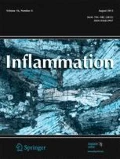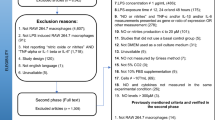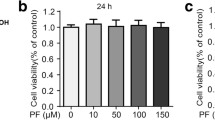Abstract
Crohn's disease is an idiopathic, chronic inflammation of the gastrointestinal tract that causes narrowing and stricturing of primarily the small and large intestine. Although the mechanism(s) by which chronic inflammation promotes stricture formation remain to be defined, it does appear to be associated histologically with a hyperplasia of smooth muscle cells and an increased deposition of collagen within the bowel wall. The objective of this study was to assess the effect of two proinflammatory cytokines, tumor necrosis factor and interleukin-1, on the proliferation of human intestinal smooth muscle cells in vitro. Human intestinal smooth muscle cells were seeded at subconfluent densities into 24-well plates in Dulbecco's modified Eagle's medium supplemented with 10% fetal bovine serum. Human recombinant tumor necrosis factor (0.1–100 ng/ml), interleukin-1 (0.1–500 ng/ml), or control medium (without cytokines) was then added to the cells and incubation continued for 48 or 72 h. Proliferation was determined by the incorporation of tritiated thymidine, added during the final 18 h, into the cellular DNA of the smooth muscle cells. Both cytokines caused a significant dose-dependent increase in intestinal smooth muscle cell proliferation relative to control. These results suggest that the interleukin-1 and tumor necrosis factor produced during chronic inflammation in vivo may enhance the proliferation of smooth muscle cells within the intestinal bowel wall and hence potentially contribute to the narrowing and stricturing of the intestine that is observed in Crohn's disease.
Similar content being viewed by others
References
Riddell, R. H. 1988. Pathology of idiopathic inflammatory bowel disease.In Inflammatory Bowel Disease. J. B. Kirgner and R. G. Shorten, editors. Lea and Febiger, Philadelphia. 329–350.
Divorak, A. M., J. E. Osaoe, R. A. Monahan, andD. R. Dickersin. 1988. Crohn's disease: Transmission electron microscopic studies.Hum. Pathol. 11:620–634.
Graham, M. F., R. F. Dieoelmann, C. O. Elson, W. J. Lindblad, N. Gotschalk, S. Gay, andR. Gay. 1988. Collagen content and types in the intestinal strictures of Crohn's disease.Gastroenterology 94:257–265.
Graham, M. F., R. F. Diegelmann, C. O. Elson, K. N. Blair, andH. P. Ehrlich. 1984. Isolation and culture of human intestinal smooth muscle cells.Proc. Soc. Exp. Biol. Med. 176:503–507.
Graham, M. F., D. E. M. Drucker, R. F. Deigelmann, andC. O. Elson. 1987. Collagen synthesis by human intestinal smooth muscle cells in culture.Gastroenterology 92:400–405.
Graham, M. F. 1992. Stricture formation: Pathophysiologic and therapeutic concepts.In Inflammatory Bowel Disease. R. P. MacDermott and W. F. Stenson, editors. Elsevier, New York. 323–335.
Graham, M. F., G. R. Bryson, andR. F. Diegelmann. 1989. Interleukin 1 is a mitogen for and selectively augments collagen production by human intestinal smooth muscle cells.Gastroenterology 96:A181 (abstract).
Fiocchi, C. 1992. Cytokines.In Inflammatory Bowel Disease. R. P. MacDermott and W. F. Stenson, editors. Elsevier. New York. 137–162.
Dinarello, C. A. 1988. Cytokines: Interleukin-1 and tumor necrosis factor (cachectin).In Inflammation, Basic Principles and Clinical Correlates. J. I. Gallin, I. M. Goldstein, and R. Snyderman, editors. Raven Press, New York. 195–208.
Sartor, R. B. 1991. Pathogenic and clinical relevance of cytokines in inflammatory bowel disease.Immunol. Res. 10:465–471.
Pullman, W. E., S. Elsbury, M. Kobayashi, A. Hapel, andW. Doe. 1992. Enhanced mucosal cytokine production in inflammatory bowel disease.Gastroenterology 102:529–537.
Issacs, K., R. B. Sartor, andS. Haskill. 1992. Cytokine messenger RNA profiles in inflammatory bowel disease mucosa detected by polymerase chain reaction amplification.Gastroenterology 103:1587–1595.
Cominelli, F., C. Nast, B. Clark, R. Schindler, R. Lierena, V. Eysselein, R. Thompson, andC. Dinarello. 1990. Interleukin-1 (IL-1) gene expression synthesis and effect of specific IL-1 receptor blockade in rabbit immune complex colitis.J. Clin. Invest. 86:972–980.
Macdonald, T., P. Hutchings, M. Choy, S. Murch, andA. Cooks. 1990. Tumor necrosis factor alpha and Interferon gamma measured at the single cell level in normal and inflamed human intestine.Clin. Exp. Immunol. 81:301–305.
Author information
Authors and Affiliations
Additional information
This work was supported by a Merit Review Grant from the Veterans Affairs Medical Research Service (M.W.O.) and by a grant from the NIH (DK43785, Project 6; M.B.G.).
Rights and permissions
About this article
Cite this article
Owens, M.W., Grisham, M.B. Cytokines increase proliferation of human intestinal smooth muscle cells: Possible role in inflammation-induced stricture formation. Inflammation 17, 481–487 (1993). https://doi.org/10.1007/BF00916587
Issue Date:
DOI: https://doi.org/10.1007/BF00916587




